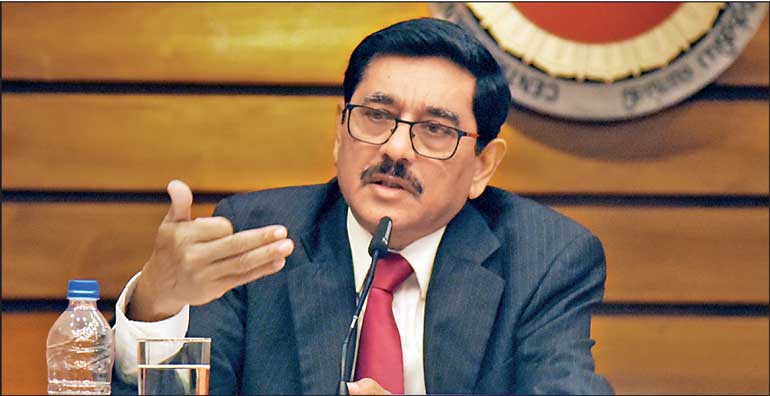Sunday Feb 22, 2026
Sunday Feb 22, 2026
Saturday, 25 November 2023 00:28 - - {{hitsCtrl.values.hits}}
 Central Bank Governor Dr. Nandalal Weerasinghe - Pic by Nisal Baduge
Central Bank Governor Dr. Nandalal Weerasinghe - Pic by Nisal Baduge
By Charumini de Silva
Reflecting a proactive approach to economic challenges, the Central Bank yesterday further reduced interest rates to support the rebound of domestic economic activity and stabilise inflation. The Monetary Board in its meeting yesterday lowered both the standing deposit facility rate and the standing lending facility rate by 100 basis points each, establishing them at 9% and 10%, respectively. In September 2023 meeting rates were at 10% and 11% respectively.
It is also noteworthy that the policy interest rates entered a single-digit level after 1.5 years. Speaking at the post-monetary policy meeting media briefing yesterday, the Central Bank Governor Dr. Nandalal Weerasinghe said additional monetary policy easing will be paused in the near term, leaving room for market interest rates to fall lower in accordance with current and previous monetary policy easing measures.
“All licenced banks need to take swift measures to reduce market lending interest rates to ensure that the benefits of the series of monetary policy easing measures are adequately passed on to businesses and households,” he added.
Noting that 14 banks have taken proactive measures to reduce lending interest rates, he acknowledged that 10 banks have not complied with the directive. “We have notified them and actions will be taken against those banks if they fail to comply before 31 December,” he added.
“With the moderation of market lending interest rates, credit to the private sector is expected to increase, thereby supporting the envisaged rebound of domestic economic activity,” he added.
The Monetary Board anticipates a swift, sizeable and broad-based reduction in overall market lending interest rates in line with the monetary policy easing measures affected since June 2023. Such adjustment in interest rates is imperative to ease the domestic monetary conditions further.
The rationale for the latest decision stems from the aim of stabilising inflation at the targeted 5% level in the medium term, thereby paving the way for the economy to achieve its potential growth.
“The Board took note of possible upside risks to inflation projections in the near term due to supply-side factors stemming from the expected developments domestically and globally. However, the Board viewed that such near-term risks would not materially change the medium-term inflation outlook, as inflation expectations of the public remain anchored and economic activity is projected to remain below par in the near to medium term,” the statement noted.
Headline inflation continues to remain low, reflecting subdued demand conditions. Headline inflation, as measured by the year-on-year (YoY) change in the Colombo Consumer Price Index (CCPI, 2021=100), was recorded at 1.5% in October compared to 1.3% in September. Food inflation continued to be negative (YoY) for the fourth consecutive month in October. The National Consumer Price Index (NCPI, 2021=100) based headline inflation (YoY) was recorded at 1% in October, compared to 0.8% in September. Both CCPI and NCPI-based core inflation (YoY), which reflects underlying, demand pressures in the economy, moderated further in October 2023, reflecting the subdued demand pressures in the economy.
A one-off upward movement in inflation is expected in the near term, driven mainly by the changes to the Value Added Tax (VAT) proposed by the Government effective January 2024.
“The spill over effects of tax measures and other developments are likely to be muted due to subdued underlying demand pressures. Hence, this rise in inflation is expected to be transitory,” the statement said.
Despite potential expansions in the merchandise trade deficit, the current account remains robust, supported by remittances and trade in services.
“Merchandise trade deficit could expand as exports moderate and imports normalise, however, the current account remains strong with significant inflows. Supported by the services sector and secondary income inflows, the current account is expected to record a surplus in 2023,” Dr. Weerasinghe said.
Mitigating external current account pressures, the Central Bank cites a notable recovery in workers’ remittances and trade in services.
The exchange rate remains stable and gross official reserves, including the swap facility from the People’s Bank of China, are estimated at around $ 3.6 billion by the end of October 2023.
